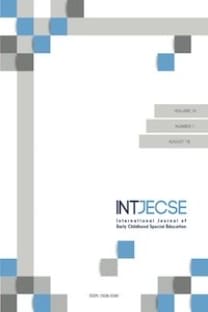İnananlar Erken Müdahale İle Karşılaştıkları Zaman
Bu makale din, maneviyat ve yetersizliği olan çok küçük çocukların bakımı arasında bir irtibat noktasını araştırmaktadır: değerlendirme görüşmesi ve ekip toplantısı. Bir vaka çalışması sunulmakta ve yetersizliğin biyomedikal ve etkileşimler modelleri (Smart & Smart, 2006) arasında karşılaştırma yapılarak yorumlanmaktadır. Sorunlar, dini değerler ve erken müdahale arasındaki ilişki ve müdahalecilerin yetiştirilmesine etkileri bağlamlarında ele alınmaktadır.
When Believers Encounter Early Intervention
This paper explores a point of contact between religion, spirituality, and the care of very young children with disabilities: the assessment interview and team meeting. One case study is presented, and interpreted in a contrast between biomedical and interactional models of disability (Smart & Smart, 2006). Issues are addressed in the larger context of the relationship between religious values and early intervention, and implications for training of interventionists.
Keywords:
early intervention, religion, spirituality team,
___
Batshaw, M., Roizen, N., & Lotrecchiano, G. (Eds.). (2012). Children with disabilities, 7th edition. Paul H. Brooks.Carnahan, S. (1995). Religion and early intervention. Invited address to the Sugarloaf Conference on Spirituality and Disability, Philadelphia, PA.
Carnahan, S, Nelson, C., & Gordon, T. (1999). A community-based approach to preventing child maltreatment. In R. Roberts and P. Magrab (Eds.), Where children live: Solutions for serving young children and their families. New York: Ablex.
Farber, M. (1999). Cultural values in disharmony: A society in distress. Paper presented at the Regional European Conference of the International Society for the Prevention of Child Abuse and Neglect . Jerusalem.
Haring, K.A., Saren, D., Lovett, D.L., & Shelton, M.N. (1992). A study of the demographic and attitudinal differences between paraprofessionals and teachers in self contained classrooms. Journal of Developmental and Physical Disabilities, 4 (1).
Harry, B. (2008). Collaboration with culturally and linguistically diverse families: Ideal versus reality. Exceptional Children, 74 (3), 372-388.
Kaslow, N., Bollini, A., Druss, B., Gluekauf, R., Goldfrank, L., Kelleher, K., Greca, A., Varela, R., & Wang, S. (2007). Healthcare for the whole person: Research update. Professional Psychology: Research and Practice, 38(3), 278-289.
Gallup Poll (2012). Religion. Retrieved from www.gallup.com/poll/1690/religion.aspx
Leyser, R. (1995). Stressors and crisis-meeting resources in Jewish families with developmentally disabled children. Issues in Special Education and Rehabilitation, 10 (1), 19-31.
Olkin, R. (1999). What psychotherapists should know about disability. Guilford.
Pargament, K., Maton, K., & Hess, R. (Eds.) (1992). Religion and prevention in mental health: Research, vision and action. Binghamton, N.Y.: The Haworth Press.
Prest, L., & Keller, J. (1993). Spirituality and family therapy: Spiritual beliefs, myths and metaphors. Journal of Marriage and Family Therapy, 19 (2), 137-148.
Rogers-Dulan, J., & Blacher, J. (1995). African American families, religion, and disability: A conceptual framework. Mental Retardation , 33, 226–238.
Rothbaum, F., Weisz, J., and Snyder, S.(1982). Changing the world and changing the self: A two-process model of perceived control. Journal of Personality and Social Psychology, 42(1), 5-37.
Sheridan, A. and Hemet, A. (1999). The role of religion and spirituality in social work education: A survey of student views and experiences. Journal of Social Work Education, 35 (1), 125-142.
Selway, D., and Ashman, A.F. (1998). Disability, religion and health: a literature review in search of the spiritual dimensions of disability. Disability and Society, 13 (3), 429-439.
Shaddock, A.J., Hill, M., and van Limbeek, C.A.H. (1998). Factors associated with burnout in workers in residential facilities for people with an intellectual disability. Journal of Intellectual and Developmental Disability, 23 (4), 309- 318.
Smart, S.F., & Smart, D.W. (2006). Models of disability: Implications for the counseling profession. Journal of Counseling and Development, 84, 29-40.
Weisner, T., Beizer, L., and Stolze, L. (1991). Religion and families of children with developmental delays. American Journal on Mental Retardation, 95 (6), 647- 662.
- ISSN: 1308-5581
- Başlangıç: 2009
- Yayıncı: İbrahim H. DİKEN
